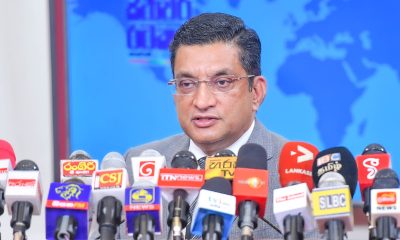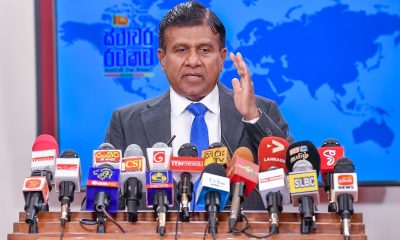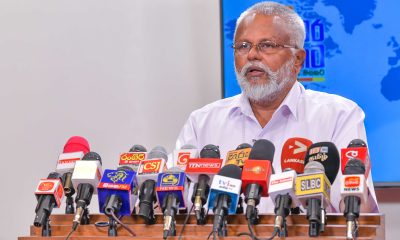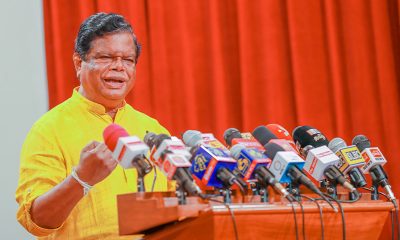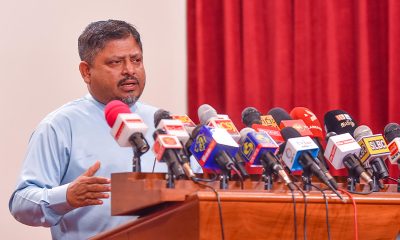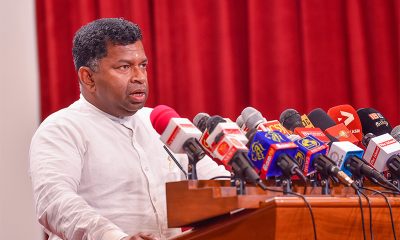Business
Sri Lanka’s foreign reserves up by USD 2billion over the past year – Acting Finance Minister
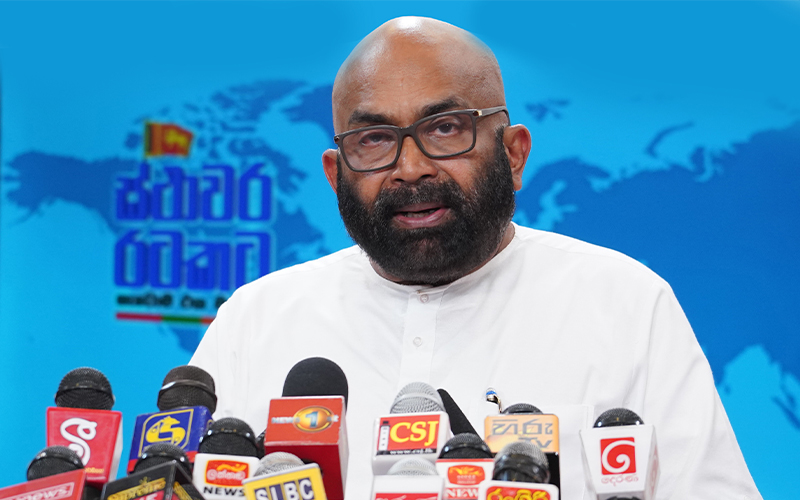
Acting Finance Minister Ranjith Siyambalapitiya during a press conference held today (21) at the Presidential Media Center, focusing on the theme of ‘Collective Path to a Stable Country’ said that over the past year, the government successfully increased the country’s foreign reserves from 1.8 billion dollars to 3.8 billion dollars.
He added that in August 2022, the exchange rate stood at Rs. 361 per dollar, but by August 2023, one dollar could be acquired for Rs. 321. This shift is not the result of artificial control but rather a reflection of the rupee’s value adjusting in response to supply and demand for the dollar, which holds significant economic importance.
The interest rate for deposits, previously at 14% in 2022, has been lowered to 11%, while the loan interest rate, previously at 15.5%, has been reduced to 12% this year. Notably, last year, the primary account deficit was Rs. -247 billion, but this year it has turned into a surplus of Rs. 27 billion. This marks the first surplus in the primary account balance in over 40 years.
Tourist arrivals, which numbered 496,430 in 2022, have surged to 904,318 during the first two quarters of this year. Equally impressive is the growth in tourism earnings, which rose from 832.6 million US dollars in 2022 to 1,304.5 million US dollars in the first two quarters of this year, reflecting a remarkable 56.7% increase compared to the previous year.
In the past year, the amount of money remitted by Sri Lankans living abroad to Sri Lanka has surged from 2,214.8 million US dollars to 3,862.7 million US dollars this year, marking a remarkable 74.4% increase according to data from the Ministry of Finance.
On August 1, 2022, the QR code system was introduced as a measure to manage petroleum demand due to foreign exchange shortages. This led to a significant disparity between normal demand and supply, resulting in a notable increase in diesel consumption by 28% and petrol consumption by 83% in June 2023, when the QR system was partially relaxed. However, as of September 1, the QR code system, which directly impacts economic growth, has been completely lifted.
Upon assuming office, President Ranil Wickremesinghe faced a daunting challenge of addressing a 14-hour power outage, which had a direct impact on the economy. Presently, the government ensures a continuous and stable electricity supply to the population.
As of August 23, 2023, there were 1467 imported goods banned due to foreign exchange shortages. Currently, the ban applies to only 279 items. Furthermore, the import of vehicles, which had been halted in 2020, now includes buses and trucks for public transport.
In April 2022, the country faced difficulties in meeting its debt obligations. However, the government has since secured the first installment under the International Monetary Fund’s Extended Credit Scheme, contributing to stabilizing the country’s economy compared to the previous year.
(PMC)
Business
Embedding human rights, equity and integrity into business leadership
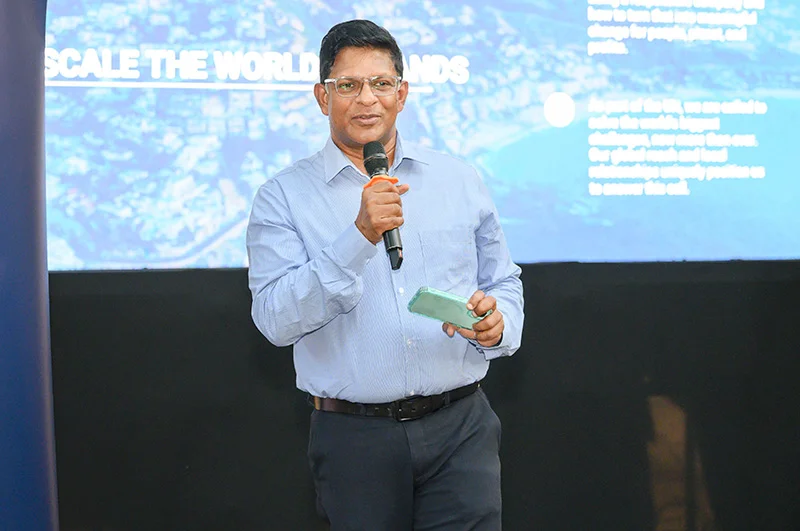
At its 2026 Social Sustainability Programme Kick-Off, the UN Global Compact Network Sri Lanka convened business leaders to advance the translation of global ambition into practical corporate action on inclusion, integrity and human rights.
On 24 February 2026, the UN Global Compact Network Sri Lanka (Network Sri Lanka) convened business leaders at Barefoot Garden Café for its 2026 Social Sustainability Programme Kick-Off, delivered in collaboration with Good Life X.
The gathering did more than introduce a calendar of events. It positioned Sri Lanka’s corporate community within the broader direction of the UN Global Compact’s 2026–2030 global strategy — a strategy anchored in three imperatives: equipping companies to act, catalyzing collective action, and advancing the business case for responsible leadership.
At its core, the 2026 Social Sustainability agenda is designed to move companies from commitment to capability.
Within the Diversity & Inclusion Working Group, this means building practical pathways toward equal pay for equal work and strengthening male allyship as a governance issue rather than a cultural afterthought. It means examining sexual and reproductive health, disability inclusion, and mental health not as employee benefits, but as structural determinants of productivity and retention. It means sharpening strategic communications so inclusion is embedded in brand integrity. It also means applying science-based behavioural change approaches to shift organizational culture in measurable ways.
Across the Business & Human Rights Working Group, equipping companies takes the form of deepened engagement on decent work and living wage implementation, strengthening human rights due diligence processes, and addressing emerging risk areas such as AI and digital rights. It extends to reinforcing business integrity and anti-corruption frameworks, understanding the social dimensions of a just transition, and recognizing the link between child rights, nutrition, and workforce productivity.
Business
Union Bank to raise LKR 3 Bn via Basel III Compliant Debenture Issue
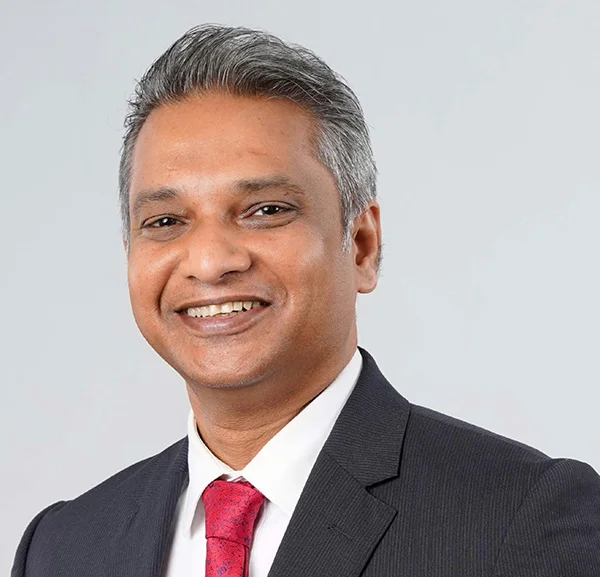
Union Bank of Colombo PLC announced its proposed Debenture Issue 2026, a strategic move aimed at raising up to LKR 3 billion. This issue is designed to bolster the Bank’s Tier II capital base and provide a robust financial foundation for its upcoming growth initiatives.
The offering consists of Basel III compliant, listed, rated, unsecured, subordinated, redeemable high-yield debentures with Non-Viability Conversion. The instrument has been assigned a rating of BB (lka) by Fitch Ratings (Lanka) Ltd, reflecting the bank’s creditworthiness and the structured nature of the subordinated debt.
Investors can choose from three distinct interest structures starting from a high-yield 13% fixed rate per annum (Type A). This option is paid annually, while Type B offers a 12.5% fixed rate paid semi-annually (12.89% AER). For those seeking market-linked returns, Type C provides a floating rate of the 182-days Treasury Bill rate plus a 400-basis point margin, also paid semi-annually.
The debentures are priced at LKR 100 per unit with a 5-year tenure (2026–2031). The initial issue size is set at 20,000,000 debentures with an option to raise 10,000,000 at the discretion of the Bank and is scheduled to open on 10 March 2026.
Shanka Abeywardene, Chief Financial Officer of Union Bank stated “This debenture issue marks a significant step in the Bank’s journey towards enhanced financial stability. By strengthening its capital adequacy, Union Bank is well-positioned to navigate evolving market conditions while fuelling its long-term strategic objectives for sustainable growth”
Business
Sanjay Kulatunga appointed to WindForce Board
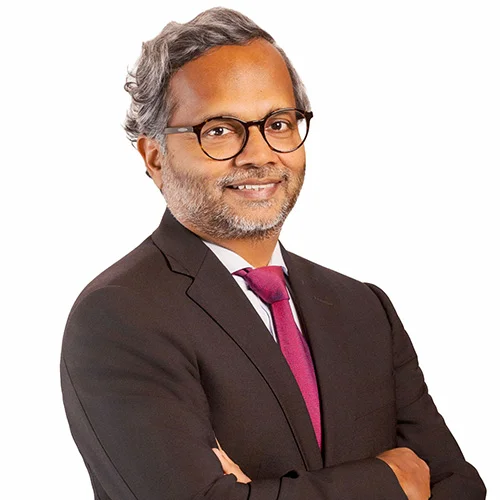
WindForce PLC announced the appointment of Sanjay Kulatunga as an Independent, Non-Executive Director to its Board with effect from 03rd March 2026, following the resignation of Dilshan Hettiaratchi. The appointment further strengthens the Company’s governance framework, strategic oversight, and long-term decision-making capabilities.
Kulatunga brings an established track record as a founder, entrepreneur, and senior executive across financial services and export-oriented industries. He is the Chief Executive Officer and Co-Founder of LYNEAR Wealth Management, a boutique investment firm established in 2013, which has since grown to become one of Sri Lanka’s largest private wealth management institutions, serving high-net-worth individuals as well as local and international institutional clients.
Prior to founding LYNEAR, Kulatunga played a pivotal role in the establishment of Amba Research, an investment research offshoring firm rooted in Sri Lanka and now operating as part of Acuity Analytics.
Over the years, he has contributed extensively to several key national institutions. His previous appointments include serving on the Financial Sector Stability Consultative Committee of the Central Bank of Sri Lanka, as well as the Board of Investment of Sri Lanka and the Securities and Exchange Commission of Sri Lanka.
-

 Features4 days ago
Features4 days agoBrilliant Navy officer no more
-

 Opinion7 days ago
Opinion7 days agoJamming and re-setting the world: What is the role of Donald Trump?
-

 Features7 days ago
Features7 days agoAn innocent bystander or a passive onlooker?
-

 Opinion4 days ago
Opinion4 days agoSri Lanka – world’s worst facilities for cricket fans
-

 Business7 days ago
Business7 days agoAn efficacious strategy to boost exports of Sri Lanka in medium term
-

 Business1 day ago
Business1 day agoCabinet nod for the removal of Cess tax imposed on imported good
-

 Features4 days ago
Features4 days agoA life in colour and song: Rajika Gamage’s new bird guide captures Sri Lanka’s avian soul
-

 Features5 days ago
Features5 days agoOverseas visits to drum up foreign assistance for Sri Lanka


